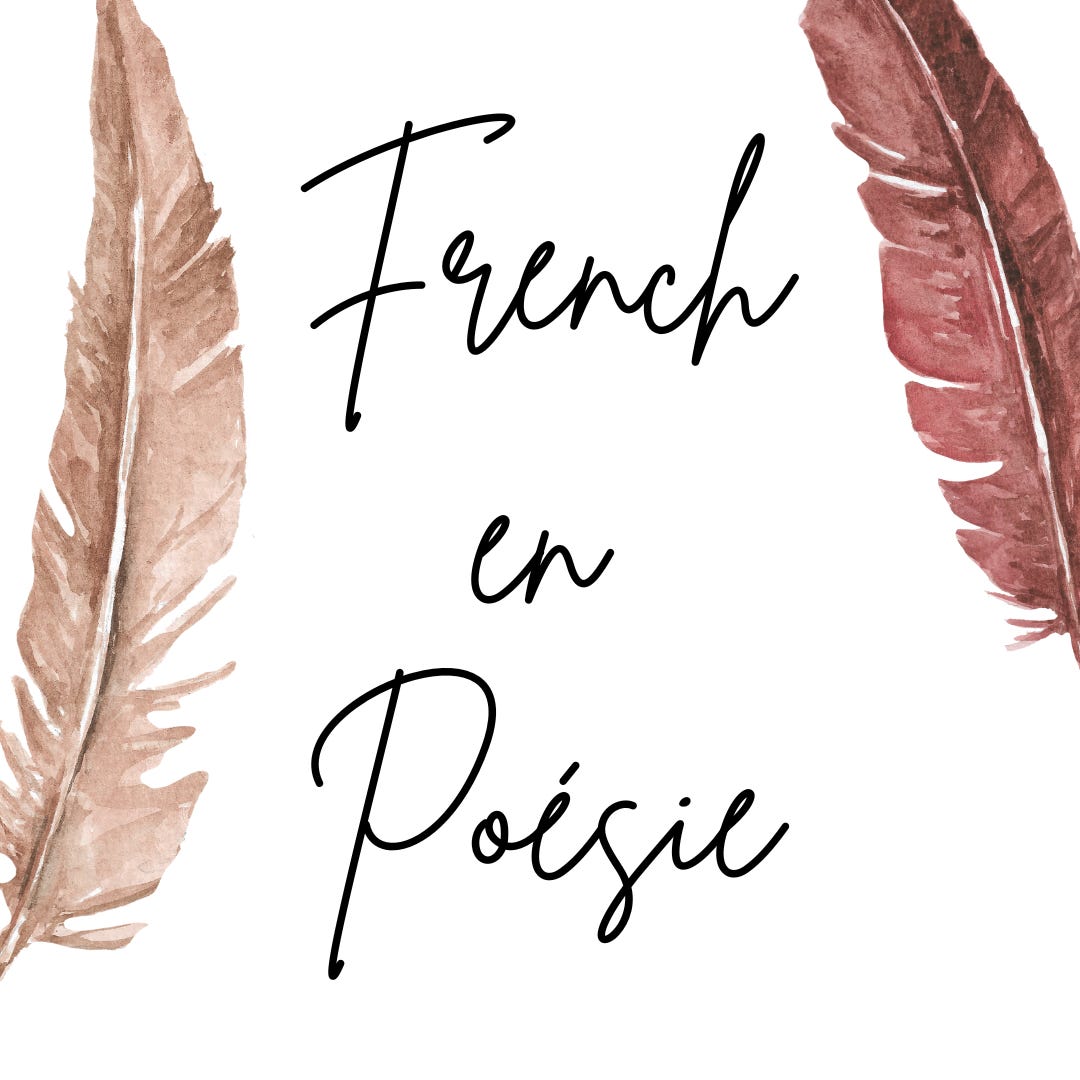Between Two Fires: The Music of French and Italian Poetry
A poetic and linguistic conversation between two sister languages
What happens when two languages born of Latin, French and Italian, meet not in a classroom, but in the silence of a poem?
In this shared reflection, through one poem, we explore the echoes, rhythms, and roots of our native tongues: French and Italian, sister languages shaped by the same ancient fire, but sung in different melodies. We read across languages, cultures, and the spaces where poetry becomes a form of learning.
Let’s step between two fires.
The Poem
La mia poesia è alacre come il fuoco
By Alda Merini
(from La volpe e il sipario, 1997)
Audio:
Italian:
French:
English Translation
My poetry is lively like fire,
it runs through my fingers like a rosary.
I do not pray, for I am a poet of misfortune
who at times silences the labor pains of birth within the hours,
I am the poet who screams and plays with those screams,
I am the poet who sings and finds no words,
I am the dry straw where sound lands,
I am the lullaby that makes children weep,
I am the vanity that lets itself fall,
the metal cloak of a long prayer
from a mourning of the past that sees no light.
Meet the Poetess:
Alda Merini (1931–2009) was a Milanese poet whose work moves between mysticism and raw intimacy. Known for her fierce, lyrical voice, she wrote of love, madness, and grief with clarity and fire. Her time in psychiatric institutions deeply shaped her poetry, turning suffering into vision. Merini remains a singular voice in Italian literature, a light, defiant and unforgettable.
Drops of Language Insights
Vocabulary Italian/French/English:
poesia / poésie / poetry
From Greek poiēsis: the act of making or creating.
fuoco / feu / fire
From Latin focus, meaning hearth or fireplace.
dita / doigts / fingers
From Latin digitus.
ninnananna / berceuse / lullaby
vanagloria / vanité / vanity
Vanagloria is a fusion of vana (empty) + gloria (glory). French vanité, from Latin vanitas.
preghiera / prière / prayer
cordoglio / deuil / mourning
Cordoglio comes from cor (heart) + dolore (pain): literally, a heart-pain. “Deuil” comes from the Latin dolus (“pain”), from dolere (“to suffer”), first appearing as dol in the 10th century, then as duel in the 11th century meaning “grief from the loss of a loved one,” with its current spelling shaped in the 17th century on the model of œil/yeux.
alacre / vive / lively
Alacre is rare and vivid in Italian, suggesting cheer, activity, intensity. French vive (from vivus, alive) is more straightforward, less archaic, more immediate.
grida / cris / screams
Some etymology gold
A word we find in all three translations with the same meaning and form, but different etymologies: “misfortune”, “sventura”, “disgrace.”
They all share a negative prefix: “mis-,” “s-”, or “dis-” indicating something that goes wrong, a negation of what comes after. In English, we have “fortune”, from the Latin “fortuna”, “fate”; the Latin word was ambivalent: “fortuna” could be both good luck or bad luck.
“Fortuna” is also used in Italian, but instead, the author chooses a more literary and solemn word, “sventura”, from the Latin “ventura”, related to the verb “venire”, “to come”. “Ventura” is “what is going to come” and the prefix turns it into something negative: bad things to come, alas, bad luck, misfortune.
Finally, in French, “disgrace” comes once again from the Latin “gratia” (from which the English “grace” originates, too): “favour” or “benevolence.” So “disgrace” is the lack of favour.
Sister Languages With Different Songs
Why are Italian and French so similar, yet different?
They are both Romance languages, that is, they both descend directly from Latin. Indeed, the Romans conquered modern France starting from the 1st century BCE, and Latin gradually replaced the pre-existing Celtic languages.
However, after the fall of the Western Roman Empire (5th century CE), Italian kept most of its Latin legacy. In the Middle Ages, vulgar, the language of the people, started acquiring literary dignity with the works of authors like Dante, Petrarch, and Boccaccio. In the following centuries, a strong regional variety developed, but after the unification of Italy as a nation in 1860, Tuscan Italian was selected as the “standard” Italian language and gradually spread thanks to the institutions, schools, and later, the media.
France, on the other hand, developed a language in which Latin blended with Celtic elements and was affected by Germanic influence, thus giving rise to Old French. The language then underwent simplifications during the Middle French period, for instance, losing case endings, and later evolved into Modern French with the standardization of the Parisian dialect and the creation of the Académie française.
However, Italian and French deeply influenced each other over the centuries: for example, during the Renaissance, Italian culture strongly influenced the French courts, while later on, French became the language of diplomacy and high society across Europe. So, although many words common to the two languages share the same Latin origin, others were borrowed later on.
The Rhythm and Music of Two Tongues
A Linguistic and Poetic Analysis
When we read Alda Merini’s poem in both Italian and French, we are not simply comparing words, we are listening to two different instruments playing the same melody, shaped by distinct prosodies, phonetics, and poetic traditions. Though sisters by birth, Italian and French breathe and move differently on the page and in the mouth. Here’s how.
Italian: A Language of Vowels and Breath
Phonetic Profile:
Italian is often described as a syllable-timed language, meaning each syllable tends to take about the same amount of time.
It is vowel-rich, with open, pure vowels (a, e, i, o, u) that are clearly enunciated.
Words tend to end in vowels, which gives Italian a flowing, melodic quality.
Prosodic Effects in the Poem:
La mia poesia è alacre come il fuoco,
trascorre tra le mie dita come un rosario.
These lines flow like a chant. The repetition of vowel endings creates a seamless forward motion, each word rolls into the next. The internal assonance (e.g., poesia/alacre/fuoco, dita/rosario) enhances musicality.
Key Features:
Stress placement is usually on the penultimate syllable, giving the language a natural sway.
Italian is sonorous, ideal for singing and recitation, hence why opera is in Italian.
Even in grief or abstraction, Italian often sounds lyrical, even physical, you hear the breath, the body.
French: A Language of Consonants and Cadence
Phonetic Profile:
French is syllable-timed in theory, but in practice, it behaves more like a stress-timed language due to its prosodic groups.
It is consonant-heavy compared to Italian, and nasal vowels and schwa elisions affect flow.
Words tend to end in silent letters, especially consonants, giving the language a more closed and subdued tone.
Prosodic Effects in the Poem:
Ma poésie est vive comme le feu,
elle glisse entre mes doigts comme un rosaire.
Here the sound is more attenuated. The sentence unfolds in shorter rhythmic units, more analytical in structure. The nasal vowels (entre, doigts) and the mute 'e' in poésie and rosaire soften the delivery, there's a kind of hushed tension.
Key Features:
French places emphasis on the final syllable of prosodic groups, not individual words.
The liaison system (linking final consonants to the next word’s vowel) creates unexpected musical effects and elisions.
French poetry is shaped by classical meter (alexandrine) and often maintains a more intellectual, restrained tone.
How This Affects the Poem
In Italian, Merini’s grief and fire feel embodied — the poem moves and burns in the mouth.
In French, the same emotion feels restrained — like pain held beneath the surface, more meditative than expressive.
Consider this pair:
sono il poeta che canta e non trova parole,
je suis le poète qui chante et ne trouve pas ses mots,
In Italian, the length and vowel clarity of canta / parole feel wide open. In French, chante / mots closes down quickly, almost swallowed. Even though both lines convey the same image, a poet singing without finding words, the acoustic effect is dramatically different.
Italian is a cello; French a flute. Both, though different, sing the same sorrow.
What We Share
For both of us, poetry & literature is more than art, it’s a way to listen to language deeply. Whether you’re learning French or Italian, exploring etymology or just chasing beauty, poems offer a rare intimacy: not just vocabulary, but voice.
We hope this post brings you not only two poems, but two perspectives and the sense that every word you learn carries its own melody, origin, and fire.
This piece is a collaboration between two writers reflecting across languages.
Hi, I am Federica, a language learner and teacher. I called my Substack "The Magic of Words" because that's what language is for me: a spell and a miracle, full of mysteries and fascination. In my weekly newsletter, I'll share language stories with you: etymology, words across languages, common origins and shifts of meaning, and all that makes our words so special. But I'm also learning French from home, and sharing my progress as a learner weekly, because I'm convinced that learning a language is a journey worth discovering and sharing, even when it happens inside our homes rather than far away. To me, talking and learning about language is a way of feeling connected to the rest of the world, and to the human experience. I am thankful to have been a guest for this wonderful and precious post.
Hi! I'm Morgane, a french teacher and writer who travelled the world and settled my heart in Copenhagen where I live with my husband and two children. I share immersive ways to learn French through poetry, literature, music, and art, for learners who want to go deeper than grammar and feel the soul of the language.
We hope this conversation inspires your own journey between words and worlds. ❤️
















English picked up the idea of rhyming from French poetry. The native Anglo-Saxon poetry worked by alliteration. I love the blend of both.
Beautiful poem(s) and discussion. I love how you compare Italian to the cello and French the flute! My two favourite instruments. But I play the cello and relate more to its emotion. I love both versions. And now have more vocabulary! Thank you!